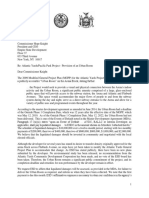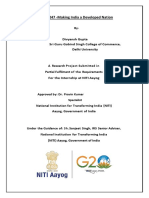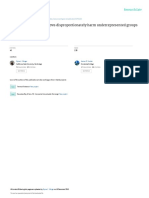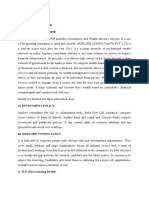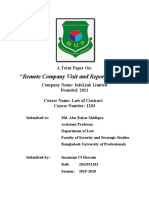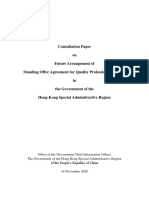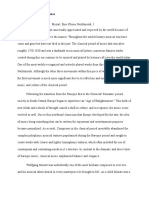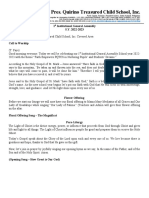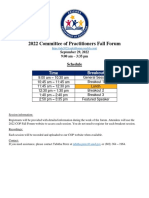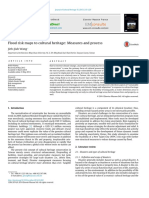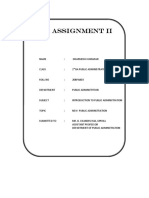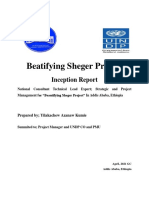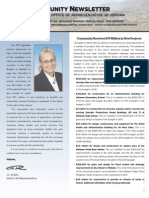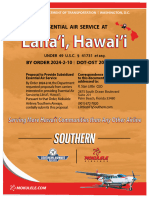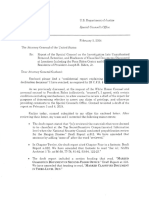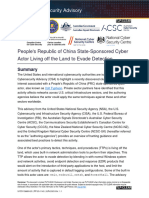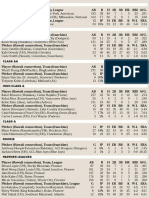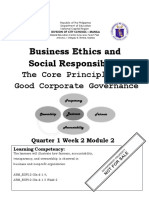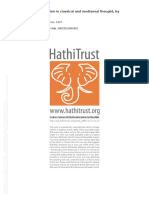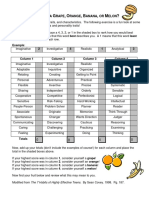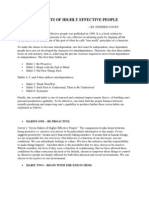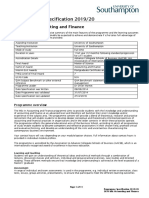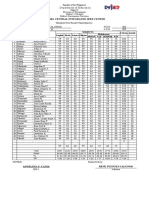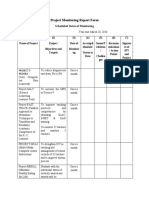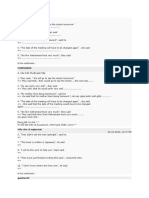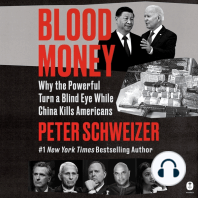Professional Documents
Culture Documents
UH President David Lassner Statement
Uploaded by
Honolulu Star-AdvertiserOriginal Title
Copyright
Available Formats
Share this document
Did you find this document useful?
Is this content inappropriate?
Report this DocumentCopyright:
Available Formats
UH President David Lassner Statement
Uploaded by
Honolulu Star-AdvertiserCopyright:
Available Formats
Statement from University of Hawaii President David Lassner
"In 1997, Hawaiʻi’s Economic Revitalization Task Force recognized that strengthening the
University of Hawaiʻi would help drive the local economy and that greater operational flexibility,
often referred to as “autonomy,” would unleash a stronger entrepreneurial approach that would
enable the university to achieve world-class standing in specific areas and diversify its funding
base. Legislation enacted in 1998 implemented that flexibility and a constitutional amendment
approved by the public in 2000 clearly stated that “The board [of regents] shall also have
exclusive jurisdiction over the internal structure, management, and operation of the university.”
The members of the task force appointed by the governor, speaker of the house and senate
president, as well as the 1998 legislature that enacted Act 115 were exactly right. The flexibility
provided through their foresight has enabled UH to exceed all expectations. UH has diversified
its operational funding far beyond the one-fifth to one-third anticipated in the 1990s.
Extramural and philanthropic funding has increased ten-fold or more to the highest levels in
history. Student success has blossomed across our islands. UH has indeed achieved world-
class distinction in multiple fields including astronomy; Earth, ocean and environmental
sciences; climate change and resilience; energy; international business; advancement of
Indigenous people; studies of Asia and the Pacific and more.
The positive economic impact of what UH has accomplished for Hawaiʻi utilizing the flexibility
provided is truly staggering. To highlight just a few findings from UHERO in 2021, in fiscal year
2020 each dollar of state general fund spending at UH translated into $7.21 of total business
sales, $2.01 of employee earning and $0.37 of state tax revenue. In addition, the 9,345 degrees
conferred to UH students in that one year are expected to produce more than $7 billion in net
lifetime earnings benefits for UH graduates over the next 40-50 years.
Over the past years we have seen an erosion of the authorities of the board of regents provided
in the 1990s. This, along with multiple examples of proposed legislation, has impacted both the
morale and ability of those within the institution to serve Hawaiʻi without undue political
influence. Nonetheless, we all remain deeply committed to our higher education mission and
the people we serve across the State. And we are proud of the work we do every day and the
successes we achieve as the institution most vital to a thriving future for Hawaiʻi."
You might also like
- Premium, Excess, Discounts & Helpline Benefits Guide: Motor InsuranceDocument7 pagesPremium, Excess, Discounts & Helpline Benefits Guide: Motor InsuranceAron gelbNo ratings yet
- Save The Sound Tweed EA Comments To FAADocument13 pagesSave The Sound Tweed EA Comments To FAAEllyn SantiagoNo ratings yet
- Mitchell School Board Agenda April 11Document80 pagesMitchell School Board Agenda April 11Erik KaufmanNo ratings yet
- Media Distribution For Mason Fitzhugh and Alex MayerDocument32 pagesMedia Distribution For Mason Fitzhugh and Alex MayerJohn Michael ObadaNo ratings yet
- CWASC Legislative Scorecard 21-22Document21 pagesCWASC Legislative Scorecard 21-22Sarah TresedderNo ratings yet
- LTR To Knight Urban RoomDocument2 pagesLTR To Knight Urban RoomSusannah PasquantonioNo ratings yet
- Svrep V Cypress - ComplaintDocument10 pagesSvrep V Cypress - ComplaintKaitlynSchallhornNo ratings yet
- Vision 2047Document31 pagesVision 2047PratyashaNo ratings yet
- Pidilite Industries' Strategy to Expand Beyond its First Success Brand FevicolDocument2 pagesPidilite Industries' Strategy to Expand Beyond its First Success Brand FevicolNikhil GuptaNo ratings yet
- Customers' perception of insuranceDocument48 pagesCustomers' perception of insuranceYogendraNo ratings yet
- In SHORT March 2021 7rgij5Document59 pagesIn SHORT March 2021 7rgij5Mayur BNo ratings yet
- Annual ReportDocument160 pagesAnnual ReportAnveshNo ratings yet
- Chrtino DiorDocument31 pagesChrtino Diormanwanimuki12No ratings yet
- Information Memorandum - The Dunes Cotton TreeDocument17 pagesInformation Memorandum - The Dunes Cotton TreekatrinajamesdesignNo ratings yet
- Silbiger Stubler 2019 Peer JDocument15 pagesSilbiger Stubler 2019 Peer JCarolina SalazarNo ratings yet
- Managing Digital Transformation in Marketing: "Fusion of Traditional Marketing and Digital Marketing"Document10 pagesManaging Digital Transformation in Marketing: "Fusion of Traditional Marketing and Digital Marketing"mohNo ratings yet
- Consent FormDocument1 pageConsent FormGlenda AbellaNo ratings yet
- AcFn 2011 CH 1 FC FinalDocument80 pagesAcFn 2011 CH 1 FC FinalNAOL BIFTUNo ratings yet
- Chandigarh University University School of Business (UBS) : Assignment No.1Document16 pagesChandigarh University University School of Business (UBS) : Assignment No.1Abhishek kumarNo ratings yet
- Chapter 2Document15 pagesChapter 2Dharani PNo ratings yet
- NYISO 2023 Power TrendsDocument46 pagesNYISO 2023 Power TrendsrkarlinNo ratings yet
- Letter To Mayor 1.31.20Document3 pagesLetter To Mayor 1.31.20Adrian MojicaNo ratings yet
- UPC Estimates Dec2022Document8 pagesUPC Estimates Dec2022Spectrum MediaNo ratings yet
- 2042951102-Inzamam Ul Hossain-Term Paper-Law of Contract-1203Document13 pages2042951102-Inzamam Ul Hossain-Term Paper-Law of Contract-1203Deo XysNo ratings yet
- June 22 Eugene City Council Agenda ItemDocument13 pagesJune 22 Eugene City Council Agenda ItemMark FurmanNo ratings yet
- Bibliografie: Case of Greenhouse Tomatoes, Proceedings of The 1991 Symposium On AutomatedDocument4 pagesBibliografie: Case of Greenhouse Tomatoes, Proceedings of The 1991 Symposium On AutomatedclenutzuNo ratings yet
- PM Street Vendor'S Atmanirbhar Nidhi (PM Svanidhi)Document2 pagesPM Street Vendor'S Atmanirbhar Nidhi (PM Svanidhi)Krish Kanna100% (1)
- DOCU-1 Integrate E2E in MICROSARDocument66 pagesDOCU-1 Integrate E2E in MICROSARAlan TorreblancaNo ratings yet
- Porter's Five Forces Analysis of the Philippine Real Estate IndustryDocument2 pagesPorter's Five Forces Analysis of the Philippine Real Estate IndustryJasonHrvyNo ratings yet
- Cmat GK 500 PDFDocument133 pagesCmat GK 500 PDFamareshgautam100% (1)
- Educational Planning in Nigeria Strategies For ImprovementDocument10 pagesEducational Planning in Nigeria Strategies For ImprovementMuhammad UsmanNo ratings yet
- Ch06 - SQL 1Document73 pagesCh06 - SQL 1Faris SuleimanNo ratings yet
- SOA-QPS5 Consultation PaperDocument22 pagesSOA-QPS5 Consultation PaperKaKiNo ratings yet
- ApprenticeshipsDocument24 pagesApprenticeshipsPaul KacarevicNo ratings yet
- BIM CodingDocument41 pagesBIM CodingbimarabiaNo ratings yet
- The Emergence of Entrepreneurship Education: Development, Trends, and ChallengesDocument21 pagesThe Emergence of Entrepreneurship Education: Development, Trends, and ChallengesIcha WijayantiNo ratings yet
- Bihar Public Service Commision ASSISTANT PDFDocument1 pageBihar Public Service Commision ASSISTANT PDFFunmaniaNo ratings yet
- Wunderwerks v. Dual Beverage - Order Denying PI (No Lawful Use in Commerce)Document11 pagesWunderwerks v. Dual Beverage - Order Denying PI (No Lawful Use in Commerce)Sarah BursteinNo ratings yet
- Chang Et Al 2016 Journal of Financial and Quantitative AnalysisDocument54 pagesChang Et Al 2016 Journal of Financial and Quantitative AnalysisLaila AbdallahNo ratings yet
- CL BOB19Document120 pagesCL BOB19visabltdNo ratings yet
- Id21 PresentationDocument108 pagesId21 PresentationHa DoanNo ratings yet
- Assignment 2.1: The 2016 Bangladesh Bank HackDocument8 pagesAssignment 2.1: The 2016 Bangladesh Bank Hackapi-651266391No ratings yet
- EDF Example 1 - SALOME PlatformDocument5 pagesEDF Example 1 - SALOME PlatformJoe PanzerNo ratings yet
- Louisiana v. Biden (Fifth Circuit No. 22-30019)Document45 pagesLouisiana v. Biden (Fifth Circuit No. 22-30019)Gary HumbleNo ratings yet
- Music Research PaperDocument6 pagesMusic Research PaperJustin HowellNo ratings yet
- Grain and Feed Annual - Dhaka - Bangladesh - 03-27-2021 PDFDocument28 pagesGrain and Feed Annual - Dhaka - Bangladesh - 03-27-2021 PDFDr. Suman PaulNo ratings yet
- August 8 PARA LITURGY File General Assembly 1Document3 pagesAugust 8 PARA LITURGY File General Assembly 1Donna Flor NabuaNo ratings yet
- FPPC Complaint Re: Marin Resource Conservation DistrictDocument27 pagesFPPC Complaint Re: Marin Resource Conservation DistrictWill HoustonNo ratings yet
- 2022 CopfallforumscheduleDocument4 pages2022 Copfallforumscheduleapi-632119205No ratings yet
- Satyendra TiwariDocument4 pagesSatyendra Tiwarihr mancomNo ratings yet
- Flood Risk Maps To Cultural Heritage Measures and Process - 2015 - Journal of Cultural Heritage PDFDocument11 pagesFlood Risk Maps To Cultural Heritage Measures and Process - 2015 - Journal of Cultural Heritage PDFJosé BritesNo ratings yet
- Project Report AkkiDocument33 pagesProject Report AkkiaakashNo ratings yet
- IPA Assignment Analyzes New Public AdministrationDocument8 pagesIPA Assignment Analyzes New Public AdministrationKumaran ViswanathanNo ratings yet
- AcknowledgementDocument10 pagesAcknowledgementShama BNo ratings yet
- Draft Scope Riverhead Logistics CenterDocument20 pagesDraft Scope Riverhead Logistics CenterRiverheadLOCALNo ratings yet
- Beatifying Sheger Project Inception ReportDocument39 pagesBeatifying Sheger Project Inception ReportDagimNo ratings yet
- AttendanDocument7 pagesAttendanshibiliagmcNo ratings yet
- Gov. Ige's BudgetDocument158 pagesGov. Ige's BudgetHNN100% (1)
- 2015 Legislative Wrap-UpDocument4 pages2015 Legislative Wrap-UprepjordanNo ratings yet
- Investing in Ohio's Future: Thriving EconomyDocument4 pagesInvesting in Ohio's Future: Thriving EconomyWSYX ABC 6No ratings yet
- Meet The 2024 Hawaii State LegislatureDocument1 pageMeet The 2024 Hawaii State LegislatureHonolulu Star-AdvertiserNo ratings yet
- Indictments Against Sebastian Mahkwan and Paul CameronDocument11 pagesIndictments Against Sebastian Mahkwan and Paul CameronHonolulu Star-AdvertiserNo ratings yet
- DOT-OST-2023-0186-0009_attachment_1Document14 pagesDOT-OST-2023-0186-0009_attachment_1Honolulu Star-AdvertiserNo ratings yet
- DOT-OST-2023-0186-0010_attachment_1Document8 pagesDOT-OST-2023-0186-0010_attachment_1Honolulu Star-AdvertiserNo ratings yet
- Report From Special Counsel Robert K Hur February 2024Document388 pagesReport From Special Counsel Robert K Hur February 2024New York Post100% (7)
- 2023 Legislative Report Release To LegislatureDocument22 pages2023 Legislative Report Release To LegislatureHonolulu Star-AdvertiserNo ratings yet
- Letter To ParentsDocument1 pageLetter To ParentsHonolulu Star-AdvertiserNo ratings yet
- EPA Drinking Water Complaints Investigation ReportDocument9 pagesEPA Drinking Water Complaints Investigation ReportHonolulu Star-AdvertiserNo ratings yet
- Report From Special Counsel Robert K Hur February 2024Document388 pagesReport From Special Counsel Robert K Hur February 2024New York Post100% (7)
- Ready For Kindergarten AssessmentDocument1 pageReady For Kindergarten AssessmentHonolulu Star-AdvertiserNo ratings yet
- CSA PRC State Sponsored Cyber Living Off The LandDocument24 pagesCSA PRC State Sponsored Cyber Living Off The LandHonolulu Star-AdvertiserNo ratings yet
- The Honolulu Star-Advertiser All-State Football Team 2023Document1 pageThe Honolulu Star-Advertiser All-State Football Team 2023Honolulu Star-AdvertiserNo ratings yet
- Hawaii Baseball Report - July 16, 2023Document1 pageHawaii Baseball Report - July 16, 2023Honolulu Star-AdvertiserNo ratings yet
- Attempted Murder Suspect Sidney Tafokitau WantedDocument1 pageAttempted Murder Suspect Sidney Tafokitau WantedHonolulu Star-AdvertiserNo ratings yet
- FINAL 20230810 CWRM W Maui Fire LTR From WMLCDocument3 pagesFINAL 20230810 CWRM W Maui Fire LTR From WMLCHonolulu Star-Advertiser100% (1)
- Top HMSA Officers' CompensationDocument1 pageTop HMSA Officers' CompensationHonolulu Star-AdvertiserNo ratings yet
- All-State Girls Soccer TeamDocument1 pageAll-State Girls Soccer TeamHonolulu Star-AdvertiserNo ratings yet
- GOP House Committee Letter To Hawaiian Electric, Hawaii Public Utilities Commission and Hawai'i State Energy OfficeDocument4 pagesGOP House Committee Letter To Hawaiian Electric, Hawaii Public Utilities Commission and Hawai'i State Energy OfficeHonolulu Star-AdvertiserNo ratings yet
- Dallas Pearce, Redacted Investigation Report FinalDocument53 pagesDallas Pearce, Redacted Investigation Report FinalHonolulu Star-AdvertiserNo ratings yet
- May 2023 Sky WatchDocument1 pageMay 2023 Sky WatchHonolulu Star-AdvertiserNo ratings yet
- All-State Softball TeamDocument1 pageAll-State Softball TeamHonolulu Star-AdvertiserNo ratings yet
- CSS Hawaii Final Report For Redaction Redacted FinalDocument570 pagesCSS Hawaii Final Report For Redaction Redacted FinalHonolulu Star-AdvertiserNo ratings yet
- BOR Settlements RPRT Roh8-12 FY22Document10 pagesBOR Settlements RPRT Roh8-12 FY22Honolulu Star-AdvertiserNo ratings yet
- Hawaii Department of Health MemoDocument18 pagesHawaii Department of Health MemoHonolulu Star-AdvertiserNo ratings yet
- All-State Boys Basketball TeamDocument1 pageAll-State Boys Basketball TeamHonolulu Star-AdvertiserNo ratings yet
- All-State Boys Soccer TeamDocument1 pageAll-State Boys Soccer TeamHonolulu Star-AdvertiserNo ratings yet
- HSTA 2023 2027 Member Settlement SummaryDocument6 pagesHSTA 2023 2027 Member Settlement SummaryHonolulu Star-AdvertiserNo ratings yet
- CSS Hawaii Final Report For Redaction Redacted FinalDocument570 pagesCSS Hawaii Final Report For Redaction Redacted FinalHonolulu Star-AdvertiserNo ratings yet
- Full Text of Mayor Rick Blangiardi's State of City SpeechDocument16 pagesFull Text of Mayor Rick Blangiardi's State of City SpeechHonolulu Star-AdvertiserNo ratings yet
- Police Statement From Principal Murphy To HPDDocument6 pagesPolice Statement From Principal Murphy To HPDHonolulu Star-AdvertiserNo ratings yet
- Simplified Group Evaluation FormDocument3 pagesSimplified Group Evaluation FormYuki GanNo ratings yet
- DepEd music and arts lessonsDocument6 pagesDepEd music and arts lessonsCharmaine BayubayNo ratings yet
- DLL Week 3Document8 pagesDLL Week 3redchest yumolNo ratings yet
- A.acuna DLP Fabm1 Week 1 Day 1 June 5, 2017Document3 pagesA.acuna DLP Fabm1 Week 1 Day 1 June 5, 2017ALMA ACUNANo ratings yet
- Grading SystemsDocument20 pagesGrading Systemsephraim zeus silvestre50% (2)
- SCM 661.outline - Fall 2019 PDFDocument3 pagesSCM 661.outline - Fall 2019 PDFMainul HossainNo ratings yet
- Field Experience Assignment #2Document2 pagesField Experience Assignment #2Natali OrtizNo ratings yet
- Ensayo Sobre Las Etapas Básicas Del Proceso de Una Empresa y Las Personas en Un Equipo de Trabajo Ga5-240202501-Aa1-Ev02Document7 pagesEnsayo Sobre Las Etapas Básicas Del Proceso de Una Empresa y Las Personas en Un Equipo de Trabajo Ga5-240202501-Aa1-Ev02Jonathan OrtizNo ratings yet
- Business Ethics - Module 2Document16 pagesBusiness Ethics - Module 2Aeio Kohen100% (1)
- The Italian Renaissance and Byzantium: The Career of The Greek Humanist-Professor John Argyropoulos in Florence and Rome (1 4 1 5 - 1 487)Document1 pageThe Italian Renaissance and Byzantium: The Career of The Greek Humanist-Professor John Argyropoulos in Florence and Rome (1 4 1 5 - 1 487)danaethomNo ratings yet
- BUNDY-Murray Wright-The Theory of Imagination in Classical and Mediaeval ThoughtDocument305 pagesBUNDY-Murray Wright-The Theory of Imagination in Classical and Mediaeval ThoughtSCHIAVETTA Angel Bernardo100% (1)
- Competitive StrategiesDocument6 pagesCompetitive StrategiesOddillia NabwireNo ratings yet
- FruitPersonality08 25 05 PDFDocument2 pagesFruitPersonality08 25 05 PDFSheni Ogunmola0% (1)
- Seven Habits of Highly Effective PeopleDocument4 pagesSeven Habits of Highly Effective PeopleJayesh JainNo ratings yet
- By Salma Ainy, Ph.D. Jul y 29, 200 8: Poetry in The Language Classroom To Assist in Development of Speaking SkillDocument11 pagesBy Salma Ainy, Ph.D. Jul y 29, 200 8: Poetry in The Language Classroom To Assist in Development of Speaking SkillCarthy TangNo ratings yet
- Didactics of Literature AP - 2019 PDFDocument7 pagesDidactics of Literature AP - 2019 PDFAleixo Domingos CaetanoNo ratings yet
- PAR ProcedureDocument116 pagesPAR ProcedureSubhranshu DwibediNo ratings yet
- Bridge Technical Expert to Modernize Nepal's Bridge TechnologiesDocument6 pagesBridge Technical Expert to Modernize Nepal's Bridge TechnologiesRam NepaliNo ratings yet
- MSC Accounting & Finance in Southampton UniversityDocument11 pagesMSC Accounting & Finance in Southampton UniversityKemala Putri AyundaNo ratings yet
- Final TTR Na Jud NiDocument1 pageFinal TTR Na Jud NiRene Fuentes CalunodNo ratings yet
- Uitm Coursework MasterDocument5 pagesUitm Coursework Masterettgyrejd100% (2)
- Project Monitoring Report FormDocument3 pagesProject Monitoring Report FormAireen SiagaNo ratings yet
- Certification documentsDocument3 pagesCertification documentsDhealine JusayanNo ratings yet
- RSS - V7 - 24sept2021 RMPC GKES RTADocument47 pagesRSS - V7 - 24sept2021 RMPC GKES RTADonaldson PagalananNo ratings yet
- English: Quarter 3 - Module 2: Write Directions Using Signal WordsDocument16 pagesEnglish: Quarter 3 - Module 2: Write Directions Using Signal WordsMark Allen Labasan67% (3)
- Nguyen Thanh Huong. Safe Vegetable. ISBMBUS1.2010Document68 pagesNguyen Thanh Huong. Safe Vegetable. ISBMBUS1.2010Ku HieuNo ratings yet
- Eng8 WLP Q3 Week3Document3 pagesEng8 WLP Q3 Week3ANNABEL PALMARINNo ratings yet
- Grade 4 6 Araling Panlipunan AnnDocument21 pagesGrade 4 6 Araling Panlipunan AnnFlordiles NavarroNo ratings yet
- SCRIPT For GraduationDocument3 pagesSCRIPT For GraduationMinajs PesitoNo ratings yet
- Bài tập mệnh đề quan hệDocument121 pagesBài tập mệnh đề quan hệNguyễn Xuân HoàngNo ratings yet
- The Courage to Be Free: Florida's Blueprint for America's RevivalFrom EverandThe Courage to Be Free: Florida's Blueprint for America's RevivalNo ratings yet
- The Russia Hoax: The Illicit Scheme to Clear Hillary Clinton and Frame Donald TrumpFrom EverandThe Russia Hoax: The Illicit Scheme to Clear Hillary Clinton and Frame Donald TrumpRating: 4.5 out of 5 stars4.5/5 (11)
- Nine Black Robes: Inside the Supreme Court's Drive to the Right and Its Historic ConsequencesFrom EverandNine Black Robes: Inside the Supreme Court's Drive to the Right and Its Historic ConsequencesNo ratings yet
- The Smear: How Shady Political Operatives and Fake News Control What You See, What You Think, and How You VoteFrom EverandThe Smear: How Shady Political Operatives and Fake News Control What You See, What You Think, and How You VoteRating: 4.5 out of 5 stars4.5/5 (16)
- Modern Warriors: Real Stories from Real HeroesFrom EverandModern Warriors: Real Stories from Real HeroesRating: 3.5 out of 5 stars3.5/5 (3)
- Thomas Jefferson: Author of AmericaFrom EverandThomas Jefferson: Author of AmericaRating: 4 out of 5 stars4/5 (107)
- Reading the Constitution: Why I Chose Pragmatism, not TextualismFrom EverandReading the Constitution: Why I Chose Pragmatism, not TextualismNo ratings yet
- Game Change: Obama and the Clintons, McCain and Palin, and the Race of a LifetimeFrom EverandGame Change: Obama and the Clintons, McCain and Palin, and the Race of a LifetimeRating: 4 out of 5 stars4/5 (572)
- The Shadow War: Inside Russia's and China's Secret Operations to Defeat AmericaFrom EverandThe Shadow War: Inside Russia's and China's Secret Operations to Defeat AmericaRating: 4.5 out of 5 stars4.5/5 (12)
- The Red and the Blue: The 1990s and the Birth of Political TribalismFrom EverandThe Red and the Blue: The 1990s and the Birth of Political TribalismRating: 4 out of 5 stars4/5 (29)
- Stonewalled: My Fight for Truth Against the Forces of Obstruction, Intimidation, and Harassment in Obama's WashingtonFrom EverandStonewalled: My Fight for Truth Against the Forces of Obstruction, Intimidation, and Harassment in Obama's WashingtonRating: 4.5 out of 5 stars4.5/5 (21)
- Commander In Chief: FDR's Battle with Churchill, 1943From EverandCommander In Chief: FDR's Battle with Churchill, 1943Rating: 4 out of 5 stars4/5 (16)
- We've Got Issues: How You Can Stand Strong for America's Soul and SanityFrom EverandWe've Got Issues: How You Can Stand Strong for America's Soul and SanityNo ratings yet
- An Ordinary Man: The Surprising Life and Historic Presidency of Gerald R. FordFrom EverandAn Ordinary Man: The Surprising Life and Historic Presidency of Gerald R. FordRating: 4 out of 5 stars4/5 (5)
- Second Class: How the Elites Betrayed America's Working Men and WomenFrom EverandSecond Class: How the Elites Betrayed America's Working Men and WomenNo ratings yet
- Slouching Towards Gomorrah: Modern Liberalism and American DeclineFrom EverandSlouching Towards Gomorrah: Modern Liberalism and American DeclineRating: 4 out of 5 stars4/5 (59)
- The Great Gasbag: An A–Z Study Guide to Surviving Trump WorldFrom EverandThe Great Gasbag: An A–Z Study Guide to Surviving Trump WorldRating: 3.5 out of 5 stars3.5/5 (9)
- Hatemonger: Stephen Miller, Donald Trump, and the White Nationalist AgendaFrom EverandHatemonger: Stephen Miller, Donald Trump, and the White Nationalist AgendaRating: 4 out of 5 stars4/5 (5)
- Witch Hunt: The Story of the Greatest Mass Delusion in American Political HistoryFrom EverandWitch Hunt: The Story of the Greatest Mass Delusion in American Political HistoryRating: 4 out of 5 stars4/5 (6)
- Camelot's Court: Inside the Kennedy White HouseFrom EverandCamelot's Court: Inside the Kennedy White HouseRating: 4 out of 5 stars4/5 (17)
- Power Grab: The Liberal Scheme to Undermine Trump, the GOP, and Our RepublicFrom EverandPower Grab: The Liberal Scheme to Undermine Trump, the GOP, and Our RepublicNo ratings yet
- The Last Republicans: Inside the Extraordinary Relationship Between George H.W. Bush and George W. BushFrom EverandThe Last Republicans: Inside the Extraordinary Relationship Between George H.W. Bush and George W. BushRating: 4 out of 5 stars4/5 (6)
- Confidence Men: Wall Street, Washington, and the Education of a PresidentFrom EverandConfidence Men: Wall Street, Washington, and the Education of a PresidentRating: 3.5 out of 5 stars3.5/5 (52)
- The Quiet Man: The Indispensable Presidency of George H.W. BushFrom EverandThe Quiet Man: The Indispensable Presidency of George H.W. BushRating: 4 out of 5 stars4/5 (1)
- Blood Money: Why the Powerful Turn a Blind Eye While China Kills AmericansFrom EverandBlood Money: Why the Powerful Turn a Blind Eye While China Kills AmericansRating: 4.5 out of 5 stars4.5/5 (10)
- The Deep State: How an Army of Bureaucrats Protected Barack Obama and Is Working to Destroy the Trump AgendaFrom EverandThe Deep State: How an Army of Bureaucrats Protected Barack Obama and Is Working to Destroy the Trump AgendaRating: 4.5 out of 5 stars4.5/5 (4)
- Socialism 101: From the Bolsheviks and Karl Marx to Universal Healthcare and the Democratic Socialists, Everything You Need to Know about SocialismFrom EverandSocialism 101: From the Bolsheviks and Karl Marx to Universal Healthcare and the Democratic Socialists, Everything You Need to Know about SocialismRating: 4.5 out of 5 stars4.5/5 (42)





